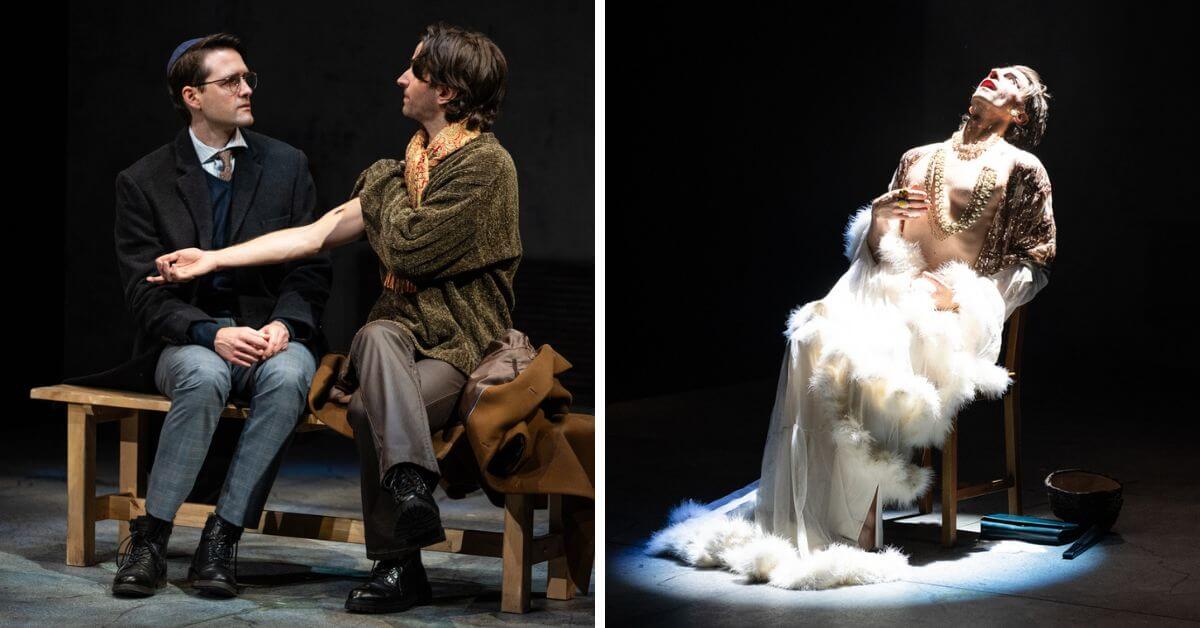
That Theatre Company & Buddies in Bad Times Theatre/Angels in America, Part One (Millennium Approaches) and Part Two (Perestroika), written by Tony Kushner, directed by Craig Pike, Buddies in Bad Times Theatre, until Dec. 17. Tickets here.
Angels in America is considered one of the greatest plays of the 20th century. The seven and a half hour epic uses the metaphor of the AIDS epidemic of the 1980s to explore the nature of humanity, the impact of religion, geopolitical issues in general, not to mention the very heart of the gay experience.
Angels Through the Decades
I have a peculiar relationship to the play whose subtitle is A Gay Fantasia on National Themes.
When I first saw Angels in America in New York in 1994, I was overwhelmed by the sweep of playwright Tony Kushner’s immense imagination. My second go-round was the Canadian Stage production in 1996, and the bloom was off the rose. I started to see the flaws in the play, or what some reviled critics had complained about when the play first opened. By the time of my third encounter with the 2013 Soulpepper offering, I found the play to be tedious at best, pretentious at worst. As for the 2003 HBO six part series, I was more interested in the actors than the play (Meryl Streep, Al Pacino, Emma Thompson).
And so we come to the current production at Buddies— my fifth meet-up with Angels in America— and I’m happy to report that I was back in 1994. The play really got to me once more.
This time, I once again saw the seven main characters in stark relief and clearly understood what each represented. Moreover, I realized the clever way that Kushner had crafted their relationships. I also accepted the many flights into magic realism that the characters undergo, seeing these fanciful encounters as necessary inclusions to the dramatic arc. When a main character played a secondary one, I saw the link between them.
In other words, this ambitious production by an upstart company does great justice to Tony Kushner and his visionary play.
Craig Pike is Craig’s Cookies, but he is also an actor, and is, apparently, using his cookie dough (pardon the pun) to finance That Theatre Company. Angels in America is his second venture. Last year he starred, with Jim Mezon, in the Caryl Churchill two-hander, A Number, which was an impressive debut. Angels in America is Pike’s directorial debut, and that is some chutzpah to take on an epic like this as a beginner project, but it works.
There is some terrific acting going on in this production.
Jim Mezon (Roy Cohn) can do no wrong in my books, and playing one of the most evil men who ever walked the earth, Mezon is absolutely despicable. Another outstanding performance comes from Allister MacDonald (Prior), who contracts AIDS, and whose journey is the play’s main throughline. Kaleb Alexander (Belize) has great fun portraying an AIDS nurse and former drag queen. How nice to see Brenda Bazinet (Hannah) back on the stage as a prim Mormon matron. There are also solid performances from Wade Bogert-O’Brien (Joe) and Ben Sanders (Louis).
I did find Christine Horne (Harper) all on one note, however. She is a better actor than this. Soo Garay (The Angel) spoke in such a mannered way that it was hard, at times, to make out her words.

The Plot
Here is the plot in a nutshell.
Roy Cohn mentors right-wing Mormon law clerk Joe, expecting favours down the line. Although Joe is married to Harper, he is a closet homosexual who begins a relationship with Louis. On the other hand, the ultra-liberal Louis is the former lover of Prior, whom he deserted when he found out that Prior had AIDS.
Belize is the only real good guy in the cast, being a faithful friend to Prior, as he struggles having to nurse the despised Roy Cohen (who has AIDS but is calling it liver cancer). Hannah is Joe’s mother who comes from Salt Lake City to help her son manage his life and marriage. Then there is the Angel who brings visions to Prior, whom the celestial community sees as a prophet.
Thus, there are two Jews, Cohn and Louis, who are on opposite sides of the political spectrum, and three Mormons, Joe, Harper and Hannah. Joe struggles with his forbidden homosexuality, Harper concedes that she is a bad Mormon and hallucinates on Valium, while Hannah rings straight and true Mormonism. It is Hannah who grows the most in terms of humanity.
The Play
Setting the play in 1985, at the height of the AIDS crisis, Kushner achieved an important breakthrough. The gay community that had been marginalized in real life was suddenly front and centre in a major American play. As theatre professor John M. Clum wrote, in 1994, “(Angels in America is) a turning point in the history of gay drama, the history of American drama, and of American literary culture”.
For the younger crowd who may not be familiar with Roy Cohn, as chief counsel to Senator Joe McCarthy and his anti-Communist un-American activities committee, he helped destroy many lives. He also worked overtime to get Julius and Ethel Rosenberg executed as Soviet spies — among other nefarious dealings. (The ghost of Ethel comes back to haunt Roy Cohn in the play.)
All the main characters play several other secondary characters, which Kushner mandated in his script as to who plays whom. In the house program, only the eight main characters are listed, so it’s fun to see who shows up in another guise as the play progresses.
The Production
Perhaps Pike’s direction is a bit static, with action happening in set places on the stage.
The audience is on both sides of the theatre, with the action taking place in the narrow corridor between. At either end are two dingy industrial walls. Kushner ordered a stripped-down set, and that is what designer Brian Dudkiewicz has provided. Besides the two beds at either end, what chairs and tables that are needed, the cast carries in and out.
Bonnie Beecher has excelled herself with the very dramatic lighting, while John Gzowski has provided one of the best sound designs of his career. The music is absolutely chilling, not to mention his brilliant sound effects. Louise Bourret’s many costumes are brilliant at evoking character.
Thus, with both acting and production values at a very high level, this production of Angels in America succeeds in every way as a great theatrical experience. It manages to grapple with Kushner’s complex, symbolic drama in a very meaningful way.
Are you looking to promote an event? Have a news tip? Need to know the best events happening this weekend? Send us a note.
#LUDWIGVAN
Get the daily arts news straight to your inbox.
Sign up for the Ludwig Van Toronto e-Blast! — local classical music and opera news straight to your inbox HERE.
- INTERVIEW | Actor Diego Matamoros Takes On Icon Walt Disney In Soulpepper Production Of Hnath Play - April 16, 2024
- SCRUTINY | Opera In Concert Shine A Light On Verdi’s Seldom Heard La Battaglia Di Legnano - April 9, 2024
- SCRUTINY | Lepage & Côté’s Hamlet Dazzles With Dance And Stagecraft Without Saying Anything New - April 5, 2024



